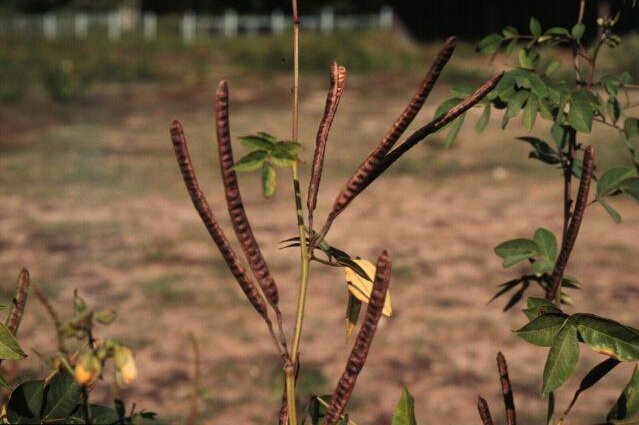The beans of the Coffee senna can be used as a caffeine-free coffee substitute, but it's leaves can be poisonous to cattle. Photo by Texas A&M Veterinary Medical Diagnostic Laboratory
COLLEGE STATION, Texas, Aug. 20 (UPI) -- During periods of drought and high heat, pressure on rangeland grass can mount. If ranchers aren't careful, desperate cattle may consume toxic plants.
Researchers at the Texas A&M Veterinary Medical Diagnostics Laboratory are warning livestock managers to be wary of toxic weed species. Experts suggest ranchers scout pastures prior to allowing cattle to graze.
Varieties of a weed called senna can be poisonous to cattle, including coffee senna, twinleaf senna, sicklepod senna and Lindheimer senna. Some of these plants have been used as food and for medicinal purposes in indigenous cultures. The weeds also taste good to hungry cows, but can sicken them.
"Just like humans, cattle will want variety in their diet and they find the coffee senna beans quite tasty as forages become less available," Tam Garland, head of the lab's toxicology section, said in a press release.
Garland says some varieties can grow successfully alongside wild grasses. Like grass, twinleaf senna, is especially appreciative of a glut of rain showers.
"People think when they get rain they've got a lot grass in the pasture, but there are other weeds that can pop up," Garland explained. "This is typical of twinleaf senna that is found growing in Central and West Texas regions where there's limestone soils."
Livestock managers often treat their land with herbicides in the spring, but toxic weed seeds can blow in and take root in the summer months.
"The biggest problem is we don't notice subtle clinical signs in our livestock, nor do we scout our pastures and look for these potentially toxic plants," Garland said.
In addition to scouting pasture, she says ranchers should be on the lookout for cattle with dark urine, diarrhea or muscle weakness. Poisoned cattle will be slow to go down to their resting position, and will remain stationary once there.
"And when they get down, they do not get up," Garland said. "That's why it's so important for daily observation of cattle and to scout pastures. These are what we call alert downers. They will eat and drink if food and water is taken to them, but they cannot get up."















